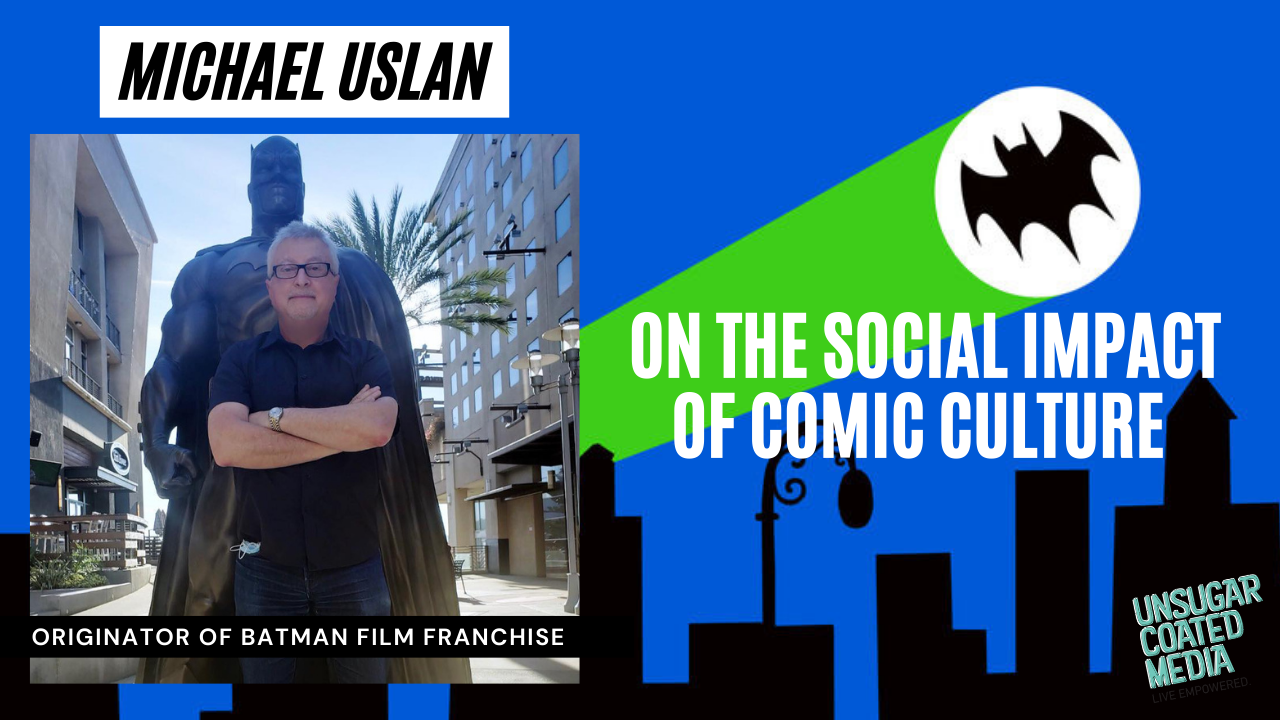
Batman’s Producer Michael Uslan Shares His Bold Approach to Creating a Comic Book-inspired Film Franchise that Continues to Reflect and Influence Social Culture
“To me, cinema is best not only when it entertains but provides that open door to look inside ourselves and come to some hard and difficult conclusions,” Michael Uslan asserts.
By Melina Costello
In Episode 40, Aalia Lanius has the pleasure of welcoming her friend and associate, Michael Uslan to the podcast, Unsugarcoated with Aalia. Uslan is the executive producer and originator of the multi-billion dollar Batman film franchise, based on the American comic book series. Passionate about the history behind comic books, he is also the first instructor to teach an accredited course on comic book folklore at any university.
“Comic book superheroes are unquestionably, for me, modern day Greek Mythology. It is our contemporary folklore,” Uslan proclaims. While superheroes are now dressed in spandex and capes, they reflect narratives embedded in American history.
“The Greeks called him Poseidon, the Romans called him Neptune, I call him Aquaman,” Uslan explains.
Comic books may be disregarded as literature by some, but their importance is not to be dismissed. Uslan expresses his desire “to bring comics, as an artform, a degree of respectability that they had been denied for decades.”
As a society and as individuals, we are educated through the messages portrayed within the media we consume. We learn through literature, adopting both the positive and negative perspectives we explore. We learn empathy, yet also develop biases and prejudices.
“The way comic books are made they are really reflectors of a changing American culture, a mirror of our society,” Uslan expresses. Once aimed at young boys, comic books have spread to a wider audience as they strive to be authentic and relevant by reflecting historical trends and addressing societal problems. Through comic books, writers began to spread awareness on topics such as civil rights, feminism, ecology, racism, bigotry, and drugs.
Amidst World War II, Captain America emerged as a figure of patriotism and hope. Following the terrorist attack on September 11, the superhero dealt with U.S. government oversight, surveillance and foreign policy.
Due to the civil rights movement, the late 1960’s positively altered the role of women in comic books. Female empowerment became an essential element to these stories, and strong and independent women became represented by characters like Lois Lane and Wonder Women.
Uslan became inspired by the Batman comic books in particular and became eager to bring the books to the big screen. He was determined to turn his vision into a reality, purchasing the film rights in 1979 when he was only 27. Uslan remained determined for ten years, charging through and gaining motivation from every “No” he received.
Sharing a piece of advice for those aspiring to enter the film industry, Uslan says, “The ones who don’t get scared and stick with it tend to be the ones who are ultimately very successful at it.”
Finally, in 1989, the first Batman movie was released, generating $411.35 million by 2018 at box offices worldwide. Batman has become an extensive film franchise and the second to ever have two of its films earn more than one billion dollars worldwide.
Lacking the superpowers that other superheroes possess, Batman became an inspiring model of how an ordinary person can achieve success through sheer will and determination––just like Uslan himself. Although the Joker is Batman’s greatest enemy, his role as the villain is equally impactful on viewers.
Stan Lee, co-creator of the entire pantheon of Marvel Superheros, once reminded Uslan, he recalls, that “the greatest and longest-lasting superheroes have been the ones with the greatest supervillains because ultimately, it’s the supervillains who define the heroes.”
The villain represents what the hero could become if they lose their integrity. The villain challenges the hero’s beliefs, as well as their strength and power. Both reading and watching the adventures of comic book superheroes molds people’s personal code of ethics as they place themselves in the superheroes shoes, asking themselves what they would do if facing the same dilemma.
Most recently, Uslan worked as the executive producer of the 2019 movie The Joker––a film that illuminated the villain’s past and brought insight into the complexity of his character, including his mental health struggles. While the movie is dark, it succeeded at being authentic and relevant. In terms of financial success, it is the most profitable comic book movie ever made, surpassing a billion dollars in profit worldwide.
Uslan shares, “What the Joker movie is to me…is a reflection––exactly the way comic books have been a reflection––a mirror of society at a moment in time that dares to use the art of cinema to present right smack in your face the situation we all find ourselves in today: in a polarized country and a polarized world in which there has become an intense lack of civility; a lack of people talking with each other anymore and just at each other; a world that has seemingly turned its back on important issues such as mental health and how that all ties into gun violence. This was daring and bold. It shouldn’t have been, but it was.”
In the episode, Aalia’s shares that her greatest mission in the new year is to promote unity through her platform, and Uslan is passionate about doing the same through cinema. He declares, “We have to accept the fact that cinema is global. The one thing that has to happen is that we have to join hands around the world. We have to find partners from different countries, different cultures where we can together create content that can play everywhere, that’s culturally sensitive, that’s organic to cultures, that’s authentic, and stop simply making content for North American boys who play video games.”
2020 brought unexpected challenges to the entire country, and as we enter 2021, Uslan expresses what he hopes for in the new year, telling Aalia, “Simply the process of healing. Just like in my comic books in the 60’s and 70’s, if we show we still care about this planet, this fragile planet we’re on, and if we care about the climate and the pollution, if we care about other people, and if we follow the principle of live and let live then we will succeed and we’ll overcome whatever it is we happen to be facing. But that’s only going to become real after a sizable time for healing.”
To learn more about Aalia and Uslan’s bold and honest approach to curating content that enlightens, empowers, unites, and heals, check out the full episode, EP 40 of Unsugarcoated with Aalia!


